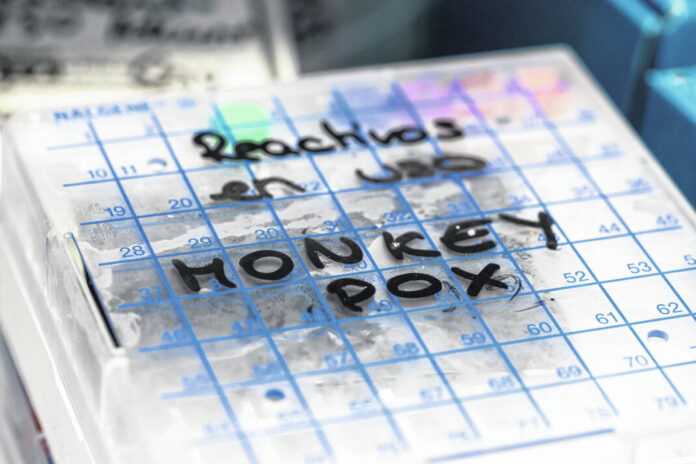
A reaction to test suspected monkeypox samples is seen inside a fridge at the microbiology laboratory of La Paz Hospital on June 06, 2022, in Madrid, Spain. Europe is at the center of the monkeypox virus outbreak, the World Health Organisation reported 780 confirmed cases with Britain, Spain, and Portugal reporting the largest numbers of patients.
Pablo Blazquez Dominguez | Getty Images (TNS)
MIAMI — As monkeypox stays on our minds, people turn to the internet for answers to their questions. The internet has no shortage of information, but it also has no shortage of misinformation.
Much of the confusion is due to the mystery surrounding the monkeypox outbreak this year, said Dr. John Esin, medical director for the department of emergency medicine at Jackson Memorial Hospital in Miami. In the past month, Esin has seen at least 20 confirmed cases of monkeypox.
You may be wondering: How can I sift through monkeypox fact and fiction? Let us help.
Is monkeypox a sexually transmitted disease?
Monkeypox has been around for six decades but never has been considered an STD, Dr. Esin said. STDs mainly spread through intercourse, but they still come with exceptions. HIV can spread through sharing needles. Syphilis can spread through kissing. Trichomoniasis can spread through sharing towels.
“You can kind of understand why most people would think that way,” he said. “Based on the medical knowledge we currently do have, I strongly believe that monkeypox … is not a sexually transmitted infection.”
Studies done in Europe have found the virus in semen and saliva, Esin said. But no study has identified semen as the cause of the outbreak.
How does monkeypox spread?
The spread of monkeypox has an element of mystery. The virus can spread through body fluids, skin-to-skin contact, lesions and contaminated surfaces and objects, Esin said.
For example, someone with monkeypox who sneezes and touches a doorknob or table can infect people who later touch those surfaces, he said. So far, the virus hasn’t proven to be airborne.
Are only gay men affected?
Ninety-nine percent of cases outside of the endemic area are in men, Esin said. All but 1% of cases are in men who have sex with men. U.S. cases have also followed this trend.
But the virus can impact anyone, he said.
The World Health Organization has advised men at risk for monkeypox to consider reducing their partners. Esin said some may view these public health measures as confirmation that monkeypox is a “gay disease” and may use it to vilify the LGBT community.
“The stigmatization is also very dangerous,” he said. “And we have to be aware that we’ve been down this path before.”
Current rhetoric mirrors the beginning of HIV/AIDS epidemic, Esin said. But the medical community drew on past mistakes and has begun to quash misconceptions.
The reality, he said, is that the virus can infect anyone in a household, including children, who have become the focus of monkeypox misinformation. And they can contract the virus by using basic items like towels or bed sheets that have had contact with positive patients.
“If we focus all our energy on a particular group of people, we forget that that group that we’re focusing on, our family members, our friends, [people] we work with, they don’t just stay in that …community,” he said.
What are monkeypox symptoms like?
Anywhere from 5 to 21 days after infection, people develop early symptoms like bad headaches, fever, back pain, muscle aches and swollen lymph nodes, said Dr. Aileen Marty, professor of infectious diseases in the Department of Medicine at Florida International University’s Herbert Wertheim College of Medicine.
These symptoms last one to three days before the rash appears. However, rashes reported in this outbreak have differed from those in previous ones, Marty said. Monkeypox-related rashes usually start on the face, palm of the hands or soles of the feet.
“In this outbreak, lesions have manifested first in the groin, and the [early symptom] has not been as severe or notable,” Marty said.
Are monkeypox vaccines safe?
Medical professionals have been familiarizing themselves with monkeypox since the recent outbreak, Esin said. The closest virus they had previously dealt with was smallpox, which was mostly treated from the ‘50s up to the ‘70s.
The vaccines available were designed and approved to combat smallpox and monkeypox. No adverse effects have been reported, and data on effectiveness will come with time, he said.
Monkeypox vaccines are being offered but are limited to high-risk groups. According to the U.S. Centers for Disease Control and Prevention, high risk is defined as anyone:
▪ In an area with known cases who has had multiple sexual partners in the past two weeks
▪ Whose sexual partners were diagnosed with monkeypox in the past two weeks
▪ Who may be exposed to the disease, such as healthcare and laboratory workers
▪ At risk for severe illness, such as people with HIV or another condition that causes them to be immunocompromised
How can I best protect myself?
Preventing monkeypox can be as simple as washing your hands, Esin said. You should also avoid touching surfaces and using clothing or blankets that someone infected may have encountered. And with COVID around as well, masking in public couldn’t hurt.
Limiting skin-to-skin contact, hugging and kissing, are integral to preventing infection, he said.
“Education and awareness of the fact that this has become a medical emergency, a public health emergency is important,” he said. “There are certain behavioral etiquettes that we have to abide by.”






